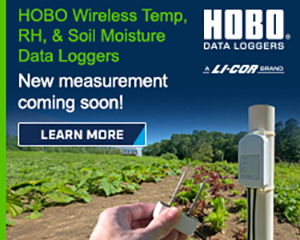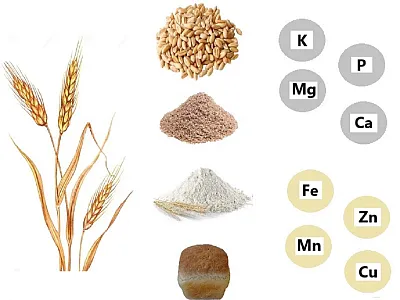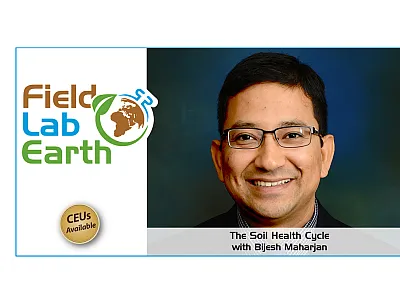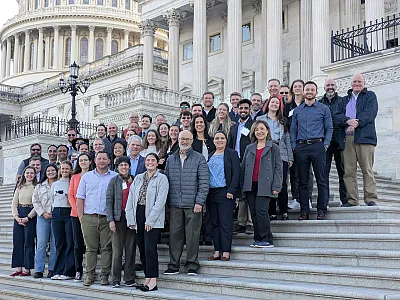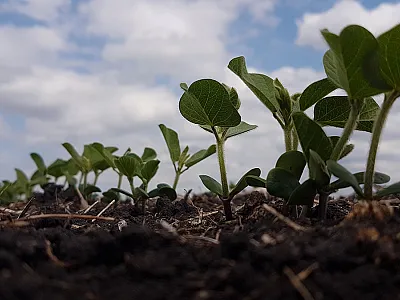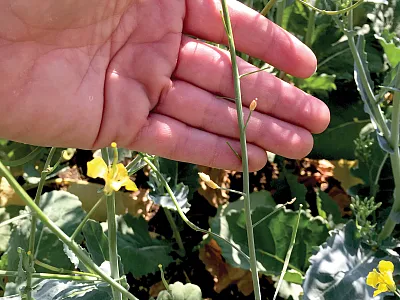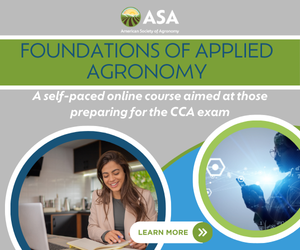Meet Karl Wyant, Vice-Chair of the International CCA Board

Dr. Karl Wyant, Vice-Chair of the International CCA Board, became an agronomist by accident. He envisioned a medical career when he entered a pre-med tract studying biology at the University of Northern Colorado. From the high desert mining and ranching town of Gallup, NM, he didn’t grow up around crop agriculture. A job post on a college biology department bulletin board altered his trajectory.
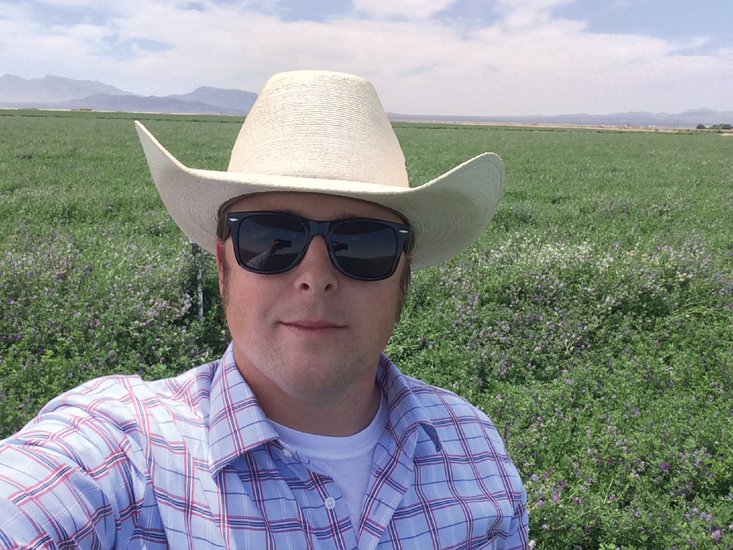
“I was working at a sandwich shop and a note advertising a soil microscope technician position caught my attention simply because it paid 20 cents more an hour,” Wyant recalls. “I knew what microscopes were. I had no idea what a soil microscope technician would do, but I was sure it would be more fun than slicing tomatoes for several hours straight.”
Traveling to cool places, exploring rangeland in the Colorado mountains and elk habitat in Wyoming, and crawling through caves in South Dakota, Wyant and his fellow lab workers would crank up heavy metal music and dig up dirt. Back at the lab, they spent hours at microscopes counting organisms, detailing their discoveries and recreating soil food webs.
This job checked important boxes for Wyant—being outside in nature, physical labor to keep the blood pumping, and the mental challenge of understanding complex interactions within soils.
From the Artic to the Desert
Setting aside thoughts of a medical career and firmly on the path to explore his newfound passion in soil science, Wyant was accepted into a master’s program at Colorado State University studying soil ecology. Experiencing international soil research in Argentina investigating soil invertebrates and examining arctic soil processes in permafrost soils on Alaska’s North Coast showed Wyant the endless possibilities within the field.
However, summers in the cold drizzle of coastal Alaska and hands frozen from handling permafrost soils had Wyant searching for warming waters, or rather warmer soils and a drier climate, to continue his work and education.
“Turns out I don’t enjoy working all day in 30 °F and a cold rain.”
Warmer, dry weather was not a problem during his work at Arizona State University where he earned a Ph.D. in biology with an emphasis on soil science. He focused on understanding biotic properties and network behavior of arid soil food web systems and associated nitrogen mineralization rates within urban landscapes and riparian and agricultural systems. His first exposure to production agriculture began with a small grant to explore soil ecology and nutrient cycling in vineyards near Sonoita, AZ.
Upon completing his Ph.D. in spring 2014, Wyant interviewed with Helena Agri Enterprises for an agronomist position. “During the interview process, I was asked if I was a CCA. Coming from a different side of soil science, I didn’t even know what a CCA was,” Wyant admits. Accepting his first agronomist position and gaining his CCA certification within the first few months of employment, he began assisting growers.
The agriculture sector in Arizona and southeastern California presents unique opportunities and challenges, Wyant says. The corn–soybean scenario that exists in much of the country is replaced with intensively managed warm- and cool-season crops. Sudangrass, cotton, and silage corn are grown during the summer; winter wheat, spinach, cauliflower, broccoli, and lettuce are produced from October to April; and alfalfa is grown year-round. As expected in a desert environment, water management, salinity issues, and nutrient deficiencies are significant hurdles for producers.
As a Desert Agronomist with Helena, he supported, trained, and empowered Pest Control Advisers with the latest information on soil properties, water quality concerns, irrigation optimization, crop performance, foliar inputs, and fertility. He also assisted employees in gaining their CCA certification, so they could better serve producers. Later on, Wyant served as the Lead Agronomist for the Western Division (AZ and CA) where he helped lead the precision agriculture and agronomic efforts across a wide variety of crops, soil types, and local climates.
From 2019 to 2022, Wyant worked with Heliae Agriculture as the Director and, later, the Vice President of Ag Science in charge of advancing the development of a novel biostimulant product line via education and marketing efforts, field trials, and greenhouse work.
In 2022, Wyant started a new position as the Director of Agronomy with Nutrien in 2022. Working with the global company focused on nutrient needs at the country level provided him with a different perspective of the industry.
“Nutrien, as the world’s largest producer of NPK, ships fertilizer all over the planet. Looking at international agriculture, nutrient needs, and retail demand at a 30,000-foot level places me on the other side of the fence. Beginning my career at the farm gate, I worked with growers daily, helping them solve challenges. I now look at challenges from a manufacturer, supply chain, and ag retailer perspective, translating the latest agronomic research focused on how we can best position fertilizers in a responsible way.”
Continually faced with challenges in fertilizer supply chains and volatility of price, as well as advocating for efficient use of nutrients, supporting the 4Rs of nutrient management, and being mindful of environmental impacts, sustainability and helping growers succeed is front of mind for Wyant.
CCAs Positioned to Best Assist Producers
Wyant believes the training CCA receive positions them to assist growers in overcoming the regulatory hurdles and challenges of modern agriculture. He has served as the Western Region CCA board chair and vice-chair as well as the chair of the desert committee. He also led the efforts in creating the Western Region CCA student scholarships and faculty mentor awards.
He is proud to represent the Western Region in his service as vice-chair for the International CCA Board and is excited to hear diverse perspectives from fellow CCAs. “I plan to quickly learn the most pressing issues, examine where I can be most effective, and put systems in place to address concerns.”
High on his priority list is implementing a task force to reach ag retailers, strengthening those partnerships. “We need to increase corporate engagement and invigorate the membership pipeline to attract more partners and stakeholders to the CCA program.” By working together with retail and company partners, Wyant believes agronomic professionals can multiply their positive impact on the industry.
“Commit to the best training, which the CCA program embodies, set yourself apart and become involved within the community. Your future opportunities are likely to originate in your network.”
Vast Opportunities Within Agriculture to Make a Difference
The CCA program gives you the opportunity to get to know people across the industry, expand your network, and build friendships, Wyant says.
“Not everyone within the ag industry comes from a farm or has access to acreage. There is lots of room for people to work within agriculture—retail, supply chains, chemical reps, soil science, formulation chemists, etc.
“Working with like-minded individuals, we can discover and teach sustainable solutions that improve the future of agriculture.”
Text © . The authors. CC BY-NC-ND 4.0. Except where otherwise noted, images are subject to copyright. Any reuse without express permission from the copyright owner is prohibited.



